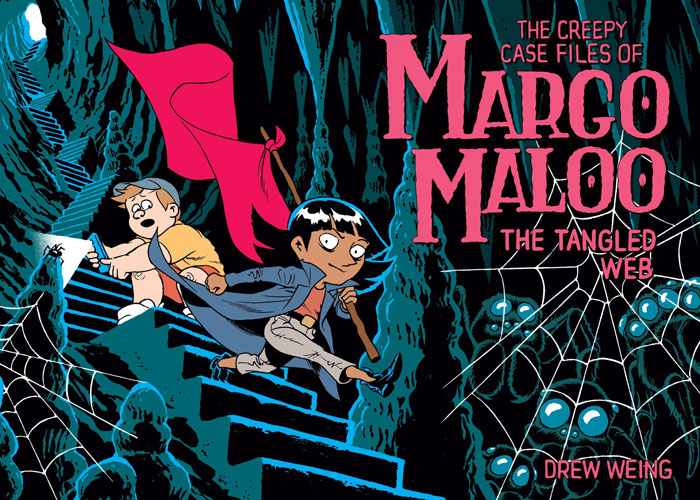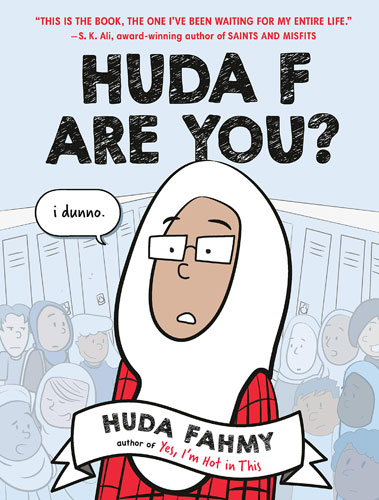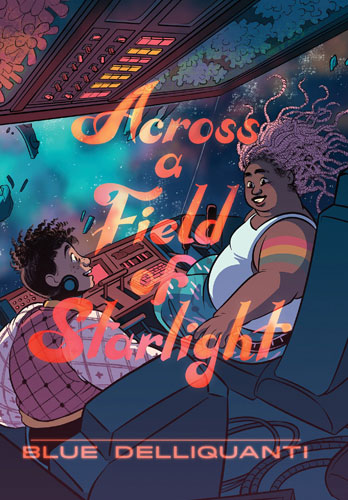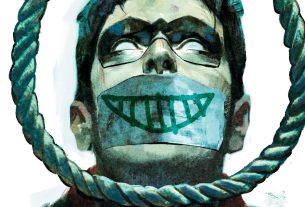The past couple weeks I’ve been dipping back into my stacks of comics, so here’s what I’ve read lately.
The Creepy Case Files of Margo Maloo (Book 3): The Tangled Web by Drew Weing
I’ve previously mentioned The Creepy Case Files of Margo Maloo here and here: Margo is the monster whisperer—she’s one of the few humans the monsters trust with their secrets, and Charles is a client who has now become sort of the Watson to her Sherlock, trying to be useful and recording her case files. Margo and Charles are back for the third book, but this time their relationship is a bit more strained than usual. Margo is concerned that Charles isn’t being careful enough with the information that she has entrusted to him, but Charles feels like he could be of better use if Margo would tell him a little more about what’s actually going on. He and Kevin (the neighbor kid) are trying to start up Secret Monster Organization for Kids Everywhere (SMOKE), recruiting kids via their website to help spread the word about misunderstandings about monsters … but there doesn’t seem to be much interest.
On the other hand, it quickly becomes evident that somebody knows Margo’s secrets and has been disrupting a lot of hidden monster homes, putting Margo’s reputation at risk. The monsters are upset, and they’re pointing the finger at Charles, but that doesn’t explain the letter that Charles received, purportedly from Margo herself. To clear things up, they have to visit the heart of the monster community and plead their case. This continues to be a fun, monster-filled story, but we still get only glimpses of Margo’s mysterious origins and how she wound up becoming the keeper of all these monster secrets, so there’s definitely more to come.
The Fifth Quarter and The Fifth Quarter: Hard Court by Mike Dawson
This comic book series follows Lori Block, a young girl who loves playing basketball. At the beginning of the first book, she’s on the fourth-grade travel team, but she usually only gets to play during the “fifth quarter,” a non-scoring period before the game officially starts. She discovers she has a talent for shooting, though, so she’s been working on her skills so that maybe she’ll be able to make it onto the team in fifth grade.
The books aren’t just about basketball. They’re also about Lori’s family and friends. In the first book, her mom decides to run for the town council, which causes some tension because she’s running against the father of Lori’s friend Maddy, and the time and energy it takes to campaign puts a bit of a strain on the entire household. Lori also struggles a bit with friendships: she has a group that she hangs out with, but she feels like she’s losing her close connection to Sophia, who plays basketball with her, to some of the other girls who want to do other things during recess. Her jokes don’t always land and come across as mean, and she’s worried that Elyse has only started basketball to “steal” Sophia from her.
The second book, Hard Court, picks up in sixth grade (and will be published in July). Lori and Elyse are on the team, but Lori’s still stuck playing mostly in the fifth quarter and then benched for the rest of the game, so she’s excited to learn about a new rec league starting up. However, old tensions arise when Lori’s mom and Maddy’s dad both volunteer to coach—so of course Lori’s friends are on the other team. This volume has a lot of flashbacks of Lori’s mom when she was young, showing her passion and drive for playing soccer. Lori’s mom was so intent on winning that she hurt others in her pursuit of victory, and as a basketball coach she pushed Lori toward similar behavior, encouraging her to be a “monster” on the court. What’s odd to me is that the book didn’t really seem to lean toward the lesson that this wasn’t a healthy relationship to sport, with messages from the mom like “it’s just gonna come down to who wants it more.” I guess it feels realistic, but it’s not the attitude I hope to cultivate in my kids generally.
Oh My Gods! II: The Forgotten Maze written by Stephanie Cooke and Insha Fitzpatrick, illustrated by Juliana Moon
I wrote about the first book in this series last year: Karen is a girl from New Jersey who winds up living on Mt. Olympus and discovering that she’s actually a demigoddess because her dad is Zeus. It’s a reimagining of the Greek gods as high schoolers, with their various dominions turned into personality quirks. The one thing that Mt. Olympus doesn’t really have is good technology, so Karen has been trying to introduce her new friends to things like smart phones and computers and her favorite video game, Holohunter. She plays online with some of her friends back in New Jersey, and it’s one of the ways she gets to stay connected to them, but she’s also hoping that she can bring her two friend groups together through the game.
However, odd things start happening in the game: a player named M1N0T4UR starts trolling her party and interfering with the game. When Karen and the rest of the crew go investigating, they discover a maze in the basement of the school that has been turned into a real-life version of Holohunter, which they’ll have to survive if they want to figure out who’s behind all of this.
I enjoyed the various glimpses into Greek-myth-as-high-school, and the introduction of a multiplayer videogame was a fun clash of cultures. Some of the action scenes, however, had a slow pace and it could be a little hard to tell what exactly was happening. Overall, though, a fun read and a good continuation of this story.
Huda F Are You? by Huda Fahmy
Huda Fahmy makes comics about what it’s like to be a Muslim woman in America. This book is loosely based on her own life, when her family moved to Dearborn, Michigan, which has a large Muslim population. It’s no longer enough for her personality to be “hijabi girl” because there are so many girls with hijabis at school now—so who is Huda, really? The story follows Huda as she tries a lot of different things to see if anything clicks, and also deals with, well, being a Muslim girl in America, because even in a town with a bigger Muslim population, there are still people who are xenophobic.
I recently read a description from Dr. Rudine Sims Bishop that books can be mirrors, windows, and sliding glass doors for readers. Books are mirrors when readers can see themselves reflected in the characters and stories, and it’s important for people to see that there are others like them. And they can be windows when readers see into the lives of people who are not like them, and the books can give them a better understanding and empathy for somebody else. Finally, they can act as sliding glass doors, allowing the reader to enter the world of the book. I like the way that, for me, Fahmy’s comic serves as a window, but also that it can be a mirror for Muslim readers who may not see characters like themselves represented in a lot of American comic books.
Across a Field of Starlight by Blue Deliquanti
This sci-fi graphic novel takes place in a universe that is increasingly under the control of the Ever-Blossoming Empire, though the rebels known as the Fireback Brigade are putting up an impressive resistance. There are those, though, who want no part of that war whatsoever, and have instead formed a commune in an isolated point in space, far from any of the worlds where battles are taking place. While they explore and research within Empire and Brigade space, they try not to interact with either side directly.
Lu is a young scientist from that colony, and one day while taking readings near a downed ship, they run into Fassen, a young soldier who was left behind after a battle. Despite the protests of Field, Lu’s ever-present computer companion, Lu decides to help save Fassen, and establishes a private communication link so they can stay in touch.
The book follows these two characters as they return to their separate worlds, and we see how different their societies are. Lu lives in a world of abundance thanks to Field, and people in their colony are able to thrive, pursue their own interests, and support each other freely in various ways. Fassen quickly rises in the ranks of the Fireback Brigade and idolizes their captain, Nide Lumen, but even as they work against the Empire, they still see all relationships as transactional: a person is only worthwhile if they can be of use. The contrast between the two is stark, and really demonstrates how our own capitalistic society often values people only for their output, and the way that affects how we relate to others.
Both of the main characters in this story are non-binary, and there’s a host of other characters in the book who don’t conform to typical gender norms, but that’s also not the focus of the book. This story has action and space battles, and it also has familial relationships and exploration; there are schemes with huge consequences that will impact entire planets and intimate stories about a growing friendship. While there are some parts of the plot that center on the characters’ gender identities, they’re folded into the larger story about an intergalactic war and a little colony that just hopes to be left in peace.
I really enjoyed Across a Field of Starlight, particularly in the way that Lu’s colony was depicted—it’s a utopian vision of a community that, despite some flaws, values each of its members and gives them space to discover who they are.
Recent Reads
Aside from the comics I shared above, I’ve got a few more that are releasing later this year, but I’ll share those when we get a little closer to the release dates! On the non-comics front, I started reading Child Zero by Chris Holm, a sci-fi thriller (coming May 10) about a world in which antibiotic-resistant viruses have ravaged the globe. Yeah, I know, I’m reading another book about devastating diseases while the real world is still wrestling with COVID-19. While there may be some similarities between the book and what we’ve experienced in terms of the healthcare system being overwhelmed, the situation in this story is even more severe: if antibiotics stop working altogether, there are all sorts of mostly harmless things that could become deadly, without any way of treating them. I haven’t gotten very far in the book yet, but so far there’s been an ugly attack on a camp in NYC where ill people were quarantined, and a 12-year-old kid who managed to escape.
Disclosure: Affiliate links to Bookshop.org help support my writing, and send funds to independent booksellers!









